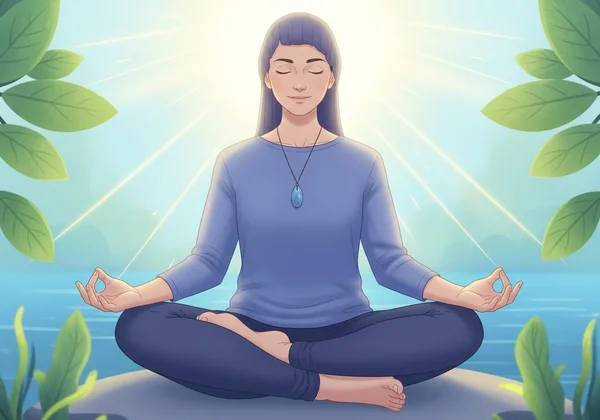التعامل مع القلق أثناء التساؤل عن هويتك الجنسية: خُذ اختبار تحديد الميول الجنسية لمجتمع الميم+ واعثر على السلام
September 15, 2025 | By Riley Foster
الشعور بالارتباك أو الحيرة أثناء استكشاف هويتك الجنسية أمر طبيعي. أنت لست وحدك. هذه الرحلة العميقة قد تجلب عدم اليقين، ولكن هذا الدليل يقدم استراتيجيات للتعامل مع قلق التساؤل عن هويتك الجنسية. دعنا نستكشف لماذا يحدث هذا وكيف يمكنك أن تجد السلام وقبول الذات. يمكن أن تكون الخطوة الأولى المفيدة هي استكشاف هذه المشاعر في مساحة خاصة، مثل اختبار تحديد الميول الجنسية لمجتمع الميم+ (LGBTQ+) الذي نقدمه.

لماذا يسبب التساؤل عن الهوية الجنسية القلق
يمكن أن تشعر عملية التساؤل عن جزء أساسي من هويتك وكأن الأرض تهتز تحت قدميك. غالبًا ما يقدم المجتمع مسارًا ضيقًا للغاية يفرض المعيار المغاير جنسياً، والخروج عنه لاستكشاف ذاتك الحقيقية يمكن أن يثير مخاوف عميقة الجذور. قد ينبع هذا من الخوف من حكم العائلة والأصدقاء، أو الارتباك حول معنى هذه المشاعر الجديدة، أو الضغط للتكيف مع تسمية لست مرتاحًا لها بعد.
يسبب هذا الصراع الداخلي إجهادًا كبيرًا، مما يؤدي إلى الإفراط في التفكير والتحليل والعزلة. إن الاعتراف بهذا القلق كاستجابة طبيعية هو الخطوة الأولى لإدارته. رحلتك فريدة ومعقدة، وهذا أمر طبيعي.
هل من الطبيعي التساؤل حول الهوية الجنسية؟
نعم، من الطبيعي للغاية التساؤل عن هويتك الجنسية. الهوية البشرية، بما في ذلك الهوية الجنسية، ليست ثابتة دائمًا؛ يمكن أن تكون مرنة وتتطور بمرور الوقت. يمر العديد من الأشخاص بتحولات في انجذاباتهم ومشاعرهم طوال حياتهم. التساؤل هو علامة على التأمل الذاتي والشجاعة – إنه يظهر أنك تتصل بذاتك الداخلية على مستوى أعمق.
اعتبرها وعيًا صحيًا بالذات. أنت تمنح نفسك الإذن لاستكشاف هويتك بما يتجاوز توقعات الآخرين. سواء كنت تعرف نفسك كمثلي، أو ثنائي الميول، أو كوير، أو تؤكد هويتك الحالية، فإن فعل التساؤل هو نمو شخصي قيم.
التعرف على علامات الارتباك والتوتر المرتبطين بالهوية
عندما تتعامل مع ضغوط ارتباك الهوية، يمكن أن يظهر ذلك بطرق مختلفة، عاطفياً وجسدياً. إن التعرف على هذه العلامات أمر بالغ الأهمية لمعالجتها بفعالية. قد تعاني من:
- الإفراط في التفكير المستمر: يتسابق ذهنك بسيناريوهات "ماذا لو" حول مستقبلك، وعلاقاتك، وكيف سينظر الناس إليك.
- تقلبات عاطفية: قد تشعر بالضيق، أو الحزن، أو الخدر دون سبب واضح. قد تتبع لحظات الوضوح فترات شديدة من الشك.
- الانسحاب الاجتماعي: يمكن أن يؤدي الخوف من الحكم أو سوء الفهم إلى عزلك عن الأصدقاء والعائلة، حتى أولئك الذين تثق بهم.
- أعراض جسدية: يمكن أن يؤثر التوتر على جسمك، مما يؤدي إلى التعب، والصداع، وتغيرات في الشهية، أو صعوبة في النوم.
إذا كانت هذه العلامات تتوافق معك، فاعلم أن هناك طرقًا عملية لإدارة ضغوط اكتشاف الذات هذه واستعادة توازنك. نقطة انطلاق رائعة لتنظيم أفكارك هي استكشاف هويتك الجنسية باستخدام أداة مصممة لتوجيه التأمل الذاتي.
استراتيجيات عملية لإدارة ضغوط رحلة اكتشاف الذات
إن الإدارة النشطة للقلق تجعل اكتشاف الذات أكثر سلامًا. بدلًا من السماح للأفكار القلقة بالتحكم فيك، استخدم تقنيات موجهة لتهدئة ذهنك، مما يوفر راحة فورية ويبني مرونة طويلة الأمد. الهدف هو إنشاء مجموعة أدوات للتنقل عبر عدم اليقين بالتعاطف مع الذات، وإيجاد ما يناسبك من خلال التجربة اللطيفة.
تقنيات اليقظة الذهنية والإحساس بالواقع للتغلب على الارتباك
عندما يبلغ القلق ذروته، يمكن أن تتصاعد أفكارك. تعد تقنيات اليقظة الذهنية والإحساس بالواقع أدوات قوية لإعادتك إلى اللحظة الحالية وتهدئة جهازك العصبي. إنها تكسر حلقة الإفراط في التفكير من خلال تركيز انتباهك على حواسك الجسدية.
جرب هذا التمرين البسيط للإحساس بالواقع:
- 5 (انظر): سمِّ خمسة أشياء يمكنك رؤيتها من حولك. لاحظ لونها وشكلها وملمسها.
- 4 (اشعر): اذكر أربعة أشياء يمكنك الشعور بها. قد يكون الكرسي تحتك، أو قدميك على الأرض، أو ملمس ملابسك.
- 3 (اسمع): استمع إلى ثلاثة أصوات. قد يكون طنين جهاز كمبيوتر، أو حركة مرور بعيدة، أو تنفسك الخاص.
- 2 (اشتم): حدد رائحتين مميزتين. ربما تكون رائحة القهوة أو الهواء النقي من نافذة مفتوحة.
- 1 (تذوق): ركز على شيء واحد يمكنك تذوقه، مثل بقايا مشروبك الأخير أو ببساطة طعم فمك.
يسحب هذا التمرين تركيزك بعيدًا عن الأفكار القلقة وإلى الواقع الملموس للحاضر، مما يوفر راحة فورية.

التدوين والتفكير الذاتي: مساحة خاصة لأفكارك
تحتاج أفكارك ومشاعرك إلى منفذ آمن، ويوفر التدوين والتفكير الذاتي مساحة خاصة تمامًا وخالية من الأحكام لاستكشافها. لا داعي للقلق بشأن كيفية فهم كلماتك. فقط اكتب.
استخدم دفتر يومياتك لفك تشابك المشاعر المعقدة، وطرح أسئلة صعبة على نفسك، والاحتفال بلحظات الوضوح الصغيرة. يمكنك استخدام بعض الأسئلة الموجهة للبدء:
- "ما الذي أخاف منه أكثر في هذه العملية؟"
- "متى أشعر بأنني أقرب ما أكون لذاتي الحقيقية؟"
- "كيف يبدو المستقبل السعيد بالنسبة لي، بغض النظر عن التصنيفات؟"
تساعد هذه الممارسة في تحديد أنماط التفكير وتعزز قبول الذات من خلال حوار شخصي مؤكد. للحصول على أسئلة موجهة، يقدم اختبار الهوية الجنسية بداية منظمة لتأملك.
تجاوز الخوف من الحكم وتنمية قبول الذات
المصدر الرئيسي للقلق هو الخوف من حكم الآخرين وأنفسنا، مما يؤدي غالبًا إلى ناقد داخلي قاسٍ. المفتاح هو تحدي هذه المخاوف، وتنمية قبول الذات، وتحويل تركيزك إلى الداخل. بينما لا يمكنك التحكم في ردود أفعال الآخرين، يمكنك التحكم في كيفية تعاملك مع نفسك، وبناء أساس من حب الذات يجعلك مرنًا في مواجهة الضغوط الخارجية.
تحدي الشكوك المترسخة والحديث السلبي مع النفس
لدينا جميعًا صوت داخلي، ولكن عندما نكون قلقين، يمكن أن يصبح هذا الصوت ناقدًا ومليئًا بـ الشكوك المترسخة والحديث السلبي مع النفس. أفكار مثل "ما الخطأ بي؟" أو "هذه مجرد مرحلة" يمكن أن تكون مدمرة للغاية. المفتاح هو تعلم تحديها.
عندما تظهر فكرة سلبية، تعامل معها كفرضية، وليس حقيقة. اسأل نفسك:
- هل هذه الفكرة صحيحة بنسبة 100%؟
- هل هناك طريقة أكثر تعاطفًا للنظر إلى هذا الموقف؟
- ماذا سأقول لصديق يواجه هذه الفكرة؟
إن استبدال النقد الذاتي القاسي بالتعاطف اللطيف مع الذات هو ممارسة. يستغرق الأمر وقتًا، ولكنه يعيد برمجة دماغك ببطء ليكون أكثر لطفًا مع نفسك.

إعطاء الأولوية لسلامتك النفسية وسط الضغوط الخارجية
من الضروري حماية طاقتك من خلال إعطاء الأولوية لسلامتك النفسية. هذا يعني وضع الحدود والمشاركة في أنشطة الرعاية الذاتية التي تجدد روحك. أنت لست ملزمًا بشرح رحلتك لأي شخص قبل أن تكون مستعدًا.
يمكن أن تبدو الرعاية الذاتية كالتالي:
- قضاء الوقت في الطبيعة.
- الانخراط في هواية تحبها.
- الحد من التعرض لوسائل التواصل الاجتماعي أو الأخبار التي تثير قلقك.
- التواصل مع وسائل الإعلام (الكتب، الأفلام، الموسيقى) التي تعرض تمثيلاً إيجابيًا لمجتمع الميم+ (LGBTQ+).
تذكر، صحتك العقلية تأتي أولاً. تخصيص وقت للعناية بنفسك ليس أنانية؛ إنه جزء ضروري من هذه العملية.
بناء شبكة دعم لصحتك النفسية لمجتمع الميم+ (LGBTQ+)
لست مضطرًا لخوض هذا بمفردك. التواصل مع الآخرين أمر حيوي لـ صحتك النفسية لمجتمع الميم+ (LGBTQ+). إن العثور على أشخاص يفهمونك، أو على الأقل يدعمونك بلا شروط، يمكن أن يحول مشاعر العزلة إلى شعور بالانتماء.
يعمل نظام الدعم القوي كحاجز ضد القلق والشك الذاتي، ويوفر مساحة لتكون على طبيعتك دون خوف. إن العثور على مجتمعك، عبر الإنترنت أو شخصيًا، هو خطوة قوية نحو قبول الذات. إذا كنت قد بدأت للتو، يمكنك إجراء اختبار الهوية الجنسية في بيئة آمنة وخاصة.
إيجاد مساحات آمنة ومجتمعات داعمة
ابحث عن مساحات آمنة ومجتمعات داعمة حيث يمكنك التواصل مع الآخرين الذين لديهم تجارب مماثلة. يمكن أن يكون هذا ناديًا لمجتمع الميم+ (LGBTQ+) في مدرستك، أو مركزًا مجتمعيًا محليًا، أو منتدى عبر الإنترنت.
تعد المجتمعات عبر الإنترنت ذات قيمة إذا لم تكن قد أعلنت عن هويتك أو تفتقر إلى الموارد المحلية. إن سماع قصص الآخرين يؤكد صحة مشاعرك ويذكرك بأنك جزء من مجتمع متنوع. توفر هذه المساحات التضامن والتفاهم الذي يمكن أن يقلل القلق بشكل كبير.
قوة الأصدقاء الداعمين والموجهين والحلفاء
لا تقلل من شأن قوة الأصدقاء الداعمين والموجهين والحلفاء. إن إفضاء أسرارك لشخص واحد فقط تعلم أنه سيدعمك بلا شروط يمكن أن يرفع عبئًا كبيرًا عن كاهلك. لا يجب أن يكون الحليف جزءًا من مجتمع الميم+ (LGBTQ+)؛ بل يجب أن يكون شخصًا يحبك ويقبلك كما أنت.
إذا كنت غير متأكد من الشخص الذي يجب أن تتحدث إليه، فابدأ بملاحظة كيف يتحدث الناس عن قضايا مجتمع الميم+ (LGBTQ+). سيظهر الحليف الحقيقي التعاطف والاحترام والرغبة في الاستماع دون حكم. يمكن أن يكون الانفتاح عليهم تجربة علاجية وتأكيدية.

رحلتك نحو السلام الداخلي واكتشاف ذاتك الحقيقية
إن التعامل مع قلق التساؤل عن هويتك الجنسية هو رحلة شجاعة وتأمل ذاتي، وفي النهاية، حب للذات. تذكر أن تكون صبورًا ولطيفًا مع نفسك في كل خطوة. مشاعرك صحيحة، وأسئلتك مهمة، وتستحق أن تجد السلام والسعادة كذاتك الحقيقية.
استخدم استراتيجيات هذا الدليل كأدواتك لإدارة التوتر وتنمية قبول الذات. تذكر أن اكتشاف الذات لا يتعلق بإجابة نهائية، بل باحتضان الشخص المتطور الذي أنت عليه. للمساعدة في طريقك، ابدأ رحلتك باختبارنا السري، وهو دليل مدروس لتأملك الشخصي.
الأسئلة المتكررة
هل من الطبيعي أن أشعر بالقلق عندما أتساءل عن هويتي الجنسية؟
نعم، إنه أمر طبيعي تمامًا. يمكن أن يثير التساؤل عن جزء أساسي من هويتك مخاوف بشأن القبول والمستقبل والتكيف. هذا القلق هو استجابة شائعة لعملية اكتشاف الذات المهمة والشخصية للغاية.
هل يمكن أن يؤثر التساؤل حول الهوية الجنسية على صحتي النفسية؟
يمكن أن يؤثر، خاصة إذا كنت تفتقر إلى بيئة داعمة. يمكن أن يساهم التوتر والارتباك في القلق والاكتئاب. لهذا السبب، فإن إعطاء الأولوية لصحتك النفسية من خلال استخدام استراتيجيات التأقلم، وطلب الدعم، والانخراط في الرعاية الذاتية أمر مهم للغاية خلال هذا الوقت.
كيف يمكنني الحصول على الدعم أثناء استكشاف هويتي؟
ابحث عن الدعم من خلال التواصل مع الأصدقاء الموثوق بهم، والانضمام إلى مجتمعات مجتمع الميم+ (LGBTQ+) عبر الإنترنت، أو البحث عن مراكز الموارد المحلية. يمكن أن يكون اختبار الهوية الجنسية السري خطوة أولى داعمة لمساعدتك على فهم مشاعرك.
ماذا لو تغيرت هويتي الجنسية بمرور الوقت؟
يمكن أن تكون الهوية الجنسية مرنة بالنسبة لبعض الأشخاص، وهذا أمر طبيعي تمامًا. يقر مفهوم "طيف الهوية الجنسية" بأن الانجذاب ليس ثابتًا دائمًا. إن منح نفسك الفرصة للتطور دون حكم هو جزء أساسي من قبول الذات. هويتك صالحة اليوم، وستظل صالحة غدًا، حتى لو بدت مختلفة.